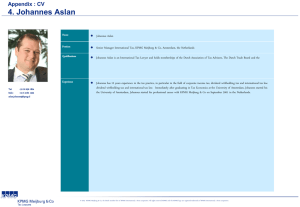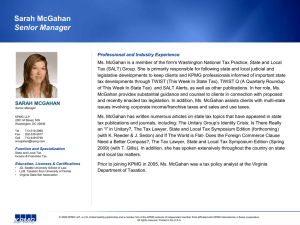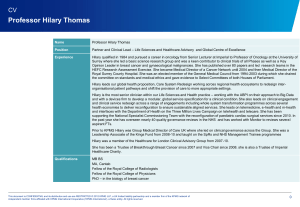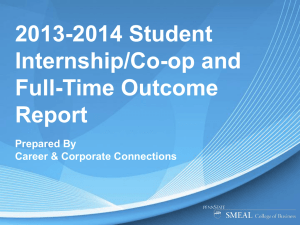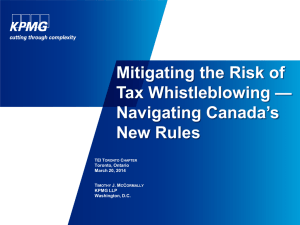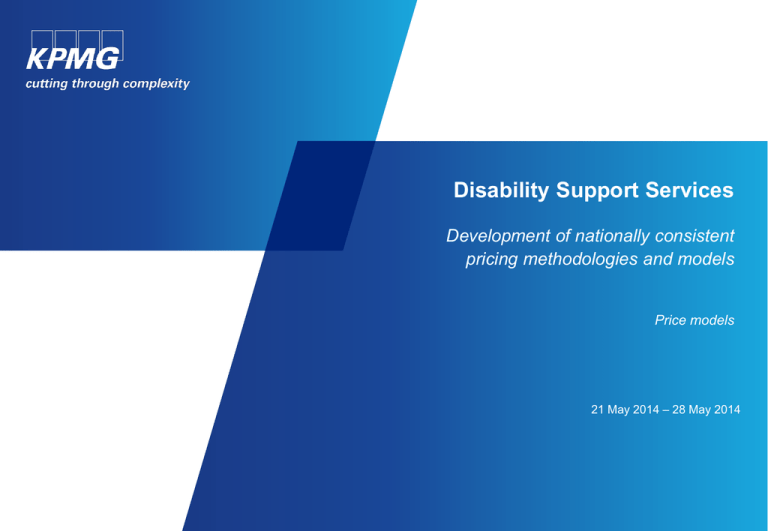
Disability Support Services
Development of nationally consistent
pricing methodologies and models
Price models
21 May 2014 – 28 May 2014
Agenda
10:00
Welcome and Introductions
10:10
Project update
10:20
Recap of prior cost collection and price mechanism activities
10:50
Pricing and transition:
• SL
• HCSS
11:30
Break
11:40
Pricing and transition continued:
• CRL
• Facility based Respite
12:20
Other services update:
• Carer Support Subsidy
• ATR
• CDS
12:40
Discussion
13:00
Lunch
© 2014 KPMG, a New Zealand partnership and a member firm of the KPMG network of independent member firms affiliated with KPMG International Cooperative
(“KPMG International”), a Swiss entity. All rights reserved. Printed in New Zealand.
1
Purpose of today
Development of nationally consistent pricing methodologies and models
■
■
■
Recap of completed project activities
•
Pricing principles
•
Cost and activity survey
•
Carer Support Subsidy carers survey
•
Pricing methodologies
New prices for services
•
New pricing models for Disability Support Services
•
Transitional considerations
•
Implementation
Opportunity for comment
© 2014 KPMG, a New Zealand partnership and a member firm of the KPMG network of independent member firms affiliated with KPMG International Cooperative
(“KPMG International”), a Swiss entity. All rights reserved. Printed in New Zealand.
2
Project objectives
To develop nationally consistent pricing methodologies and pricing models for
selected Disability Support Services
■
■
That result in:
•
Nationally consistent pricing
•
Cost reflective pricing
•
Equity and clarity for providers
•
Equity and clarity for service users
That in the longer term contribute towards:
•
Sector development that focuses on: sustainability, efficiency, and quality
•
Best long-term outcomes for: clients, providers, and the disability support sector as a whole
© 2014 KPMG, a New Zealand partnership and a member firm of the KPMG network of independent member firms affiliated with KPMG International Cooperative
(“KPMG International”), a Swiss entity. All rights reserved. Printed in New Zealand.
3
Project update – scope of project
Pricing models and prices to be developed for:
■
Supported Living (SL)
■
Home and Community Support Services (HCSS)
■
Community Residential Living (CRL)
■
Facility based Respite
■
Child Development Services (CDS)
■
Assessment, Treatment & Rehabilitation (ATR)
■
Carer Support Subsidy
© 2014 KPMG, a New Zealand partnership and a member firm of the KPMG network of independent member firms affiliated with KPMG International Cooperative
(“KPMG International”), a Swiss entity. All rights reserved. Printed in New Zealand.
4
Project update
Pricing Principles
Service Descriptions
• Develop the basis under which pricing methodologies and prices
will be determined
• Ensure common understanding and agreement as to how
services are described and counted
Develop data collection tool
• Review data availability and quality and develop data collection
tool
Data Collection
• Sector wide data collection to identify costs of service delivery
Approach to pricing
Setting prices and implementation
planning
• Review contemporary approaches to pricing and consider
suitability in the NZ context
• Set prices and develop and implementation and management
plan
© 2014 KPMG, a New Zealand partnership and a member firm of the KPMG network of independent member firms affiliated with KPMG International Cooperative
(“KPMG International”), a Swiss entity. All rights reserved. Printed in New Zealand.
5
Project update
Pricing Principles
Service Descriptions
Develop data collection tool
• Sector Forums: 1 to 12 July
• Consultations / site visits: 1 to 12 July
• Pilot Survey: 5 August to 16 August
Data Collection
• Sector wide data collection: 26 August to End December
Approach to pricing
• Second consultation Phase: 25 November to 6 December
Setting prices and implementation
planning
• Price modelling and implementation: January to Present and
onwards
© 2014 KPMG, a New Zealand partnership and a member firm of the KPMG network of independent member firms affiliated with KPMG International Cooperative
(“KPMG International”), a Swiss entity. All rights reserved. Printed in New Zealand.
6
Before we start…
THANK YOU
Thank you again to those of you who have given
your: time, knowledge and data to this project.
We have appreciated your input and guidance.
© 2014 KPMG, a New Zealand partnership and a member firm of the KPMG network of independent member firms affiliated with KPMG International Cooperative
(“KPMG International”), a Swiss entity. All rights reserved. Printed in New Zealand.
7
Recap of prior cost collection and
price mechanism activities
Pricing Principles
Survey of Services and Costs
Pricing methodologies
Pricing Principles
A series of Pricing Principles were developed to guide both pricing and
implementation of new pricing:
■
Pricing enhances the ability of disabled people to exercise self-determination
■
Pricing should result in nationally consistent and transparent prices
■
Pricing must always drive efficiency
■
Pricing enhances sustainability of a quality disability support system
■
Pricing promotes an equitable and responsive disability support system that advances continuous
quality improvement and choice
Underpinning Pricing Principles is the recognition of the importance of:
■
Respect of the rights of people with disabilities
■
Open and ethical relationships between funder and provider
http://www.health.govt.nz/system/files/documents/pages/dss-pricing-principles-nov13.docx
© 2014 KPMG, a New Zealand partnership and a member firm of the KPMG network of independent member firms affiliated with KPMG International Cooperative
(“KPMG International”), a Swiss entity. All rights reserved. Printed in New Zealand.
9
Surveys of costs and services
The cost and services surveys highlighted:
■
■
The profiles of costs incurred by organisations have high levels of consistency:
•
Consistency in the unit cost of inputs (e.g. the cost of an hour of staff time)
•
Consistency in each disability service of types of costs (e.g. labour versus non labour costs)
Where providers incur higher unit costs in one area they typically manage these by switching
decisions regarding the balance / volume of units used
•
These variations are not driven by structural factors such as provider size or location.
The high levels of commonality align with the concept of consistent national pricing
There are two services whose underlying costs are highly variable:
■
RIDSAS-CRL
■
CRL for the most complex clients (packages >$160,000)
There will be no changes to the price / purchasing arrangements for these services as
a result of this project
© 2014 KPMG, a New Zealand partnership and a member firm of the KPMG network of independent member firms affiliated with KPMG International Cooperative
(“KPMG International”), a Swiss entity. All rights reserved. Printed in New Zealand.
10
Profile of activity by service team
Service team activity
Percentage of direct staff time
100%
80%
Management
60%
Administration
40%
Service planning
20%
Service delivery
0%
HCSS
SL
CRL
Respite
Service type
© 2014 KPMG, a New Zealand partnership and a member firm of the KPMG network of independent member firms affiliated with KPMG International Cooperative
(“KPMG International”), a Swiss entity. All rights reserved. Printed in New Zealand.
The profile of activity
by service team
members reflects the
nature of disability
support service type:
■
Respite requires
higher levels of
planning administration
and management
compared to CRL due
to the constantly
changing clients
■
SL needs higher levels
of planning compared
to HCSS due to the
service line’s
objectives
11
Profile of service team wage costs
The profile of costs in
home based and facility
based services are
broadly similar:
Direct staff cost
Percentage of direct staff cost
100%
80%
■
For all services 86 to 88
percent of staff costs are
incurred by client facing
staff
■
CRL and Respite spend
marginally more on
management than HCSS
and SL reflecting:
Managers
60%
Adminstrators
40%
Client facing staff
20%
•
higher average cost
of managers in CRL
•
higher volumes of
management time
required in Respite
0%
HCSS
SL
CRL
Service type
Respite
© 2014 KPMG, a New Zealand partnership and a member firm of the KPMG network of independent member firms affiliated with KPMG International Cooperative
(“KPMG International”), a Swiss entity. All rights reserved. Printed in New Zealand.
12
Service team staff costs
Sector staff pay rates
$40.00
$ per hour (ex on-costs)
$35.00
$30.00
$25.00
CRL
Respite
HCSS
SL
$20.00
$15.00
$10.00
Disability Support
Worker
HCSS
HCSS Hshld
Hshld
Management
Management
HCSS Personal Care
Admin staff
Line Management
Staff type
■
CRL management rates reflect presence of more complex management structures
■
All services had similar levels of on-costs at around 20% uplift on labour rates
•
These include: all forms of leave, ACC, KiwiSaver, and some allowances
© 2014 KPMG, a New Zealand partnership and a member firm of the KPMG network of independent member firms affiliated with KPMG International Cooperative
(“KPMG International”), a Swiss entity. All rights reserved. Printed in New Zealand.
13
Profile of all cost types
The profile of total
costs incurred to
deliver a service
reflects the nature of
the service model /
specification
Profile of cost types
Percentage of total costs
100%
80%
Indirect costs
■
Home based services
have lower rates of nonlabour costs reflecting
their lower reliance on
infrastructure and nonlabour inputs
■
In CRL higher rates of
direct costs are incurred
compared to facility
based respite reflecting
the wider range of
service inputs used for
longer term clients
60%
Direct costs
40%
Labour & On-costs
20%
0%
HCSS
SL
CRL
Service type
Respite
© 2014 KPMG, a New Zealand partnership and a member firm of the KPMG network of independent member firms affiliated with KPMG International Cooperative
(“KPMG International”), a Swiss entity. All rights reserved. Printed in New Zealand.
14
Units of service and pricing units – driving considerations
The survey told us that providers manage to a common set of delivery units:
■
HCSS and SL: hours of client service
•
…though the precise definition of ‘hour’ appears to vary between providers re: client face-to-face
hours versus travel hours versus planning hours when away from client
■
CRL: place in house
■
Facility based respite: place in facility (full day/half day)
Last round of consultations with sector indicated that pricing units:
■
Should be aligned with either these delivery units or inputs
■
The sector and the services are not ready for outcome based pricing
© 2014 KPMG, a New Zealand partnership and a member firm of the KPMG network of independent member firms affiliated with KPMG International Cooperative
(“KPMG International”), a Swiss entity. All rights reserved. Printed in New Zealand.
15
Units of service and pricing units – driving considerations continued
Pricing Principles indicated that pricing should be:
■
“Transparent” – i.e. be clear and simple about what is being purchased
■
“Enhance the ability of disabled people to exercise self determination” – i.e. be priced in a manner
that:
•
is clear to a person what they are purchasing
•
helps a person understand the trade offs between different purchase decisions
(Increasingly relevant in the context of Individualised Funding)
© 2014 KPMG, a New Zealand partnership and a member firm of the KPMG network of independent member firms affiliated with KPMG International Cooperative
(“KPMG International”), a Swiss entity. All rights reserved. Printed in New Zealand.
16
Units of service and pricing units
HCSS
SL
CRL
Respite
Delivery unit
Client hour
Client hour
Place in house
Place in facility (full or
half day)
Client purchase
perspective
Time of staff member
in client’s home
Time of staff member:
with client and spent
organising and
planning for client
Place in house and
amount of staff time
available to client
Place and care
Pricing principle
Simple pricing structure
Pricing structure that reflects what the client perceives in the purchase
Proposed price unit
Hour of service time
Place in facility (full or
half day)
Basis of cost
treatment in price
unit
Reflect standard costs of inputs:
• Staff costs of hours for service time
plus
• Staff costs for service team supporting delivery of service time
• Labour on-costs on top of staff costs (e.g. leave, ACC)
• Direct non-labour service delivery costs (e.g. food in CRL)
• Organisational management costs (share)
• Organisational overheads (share)
Per three other
service lines
(Maybe modified for changes to service model: e.g. CRL in client
rented property)
© 2014 KPMG, a New Zealand partnership and a member firm of the KPMG network of independent member firms affiliated with KPMG International Cooperative
(“KPMG International”), a Swiss entity. All rights reserved. Printed in New Zealand.
…plus…
Modification for:
• Standard hours to
deliver place
• Standard utilisation
rate
17
Consistent pricing and consistent assessment
Nationally consistent pricing that delivers provider and client equity requires:
■
Prices, supported by:
■
Consistent needs assessment practice by NASCs
■
Consistent use of a single pricing tool for a service type
Currently there are low levels of consistency due to a range of pricing tools
■
Pricing reform will eliminate this variability
■
The reform process will be managed by MoH to ensure that the transition to new prices and
consistent tools do not result in changes that:
•
Compromise the viability of the provider
•
Jeopardise the delivery of services to clients
•
Compromise the capacity of MoH to purchase services
© 2014 KPMG, a New Zealand partnership and a member firm of the KPMG network of independent member firms affiliated with KPMG International Cooperative
(“KPMG International”), a Swiss entity. All rights reserved. Printed in New Zealand.
18
Questions?
© 2014 KPMG, a New Zealand partnership and a member firm of the KPMG network of independent member firms affiliated with KPMG International Cooperative
(“KPMG International”), a Swiss entity. All rights reserved. Printed in New Zealand.
19
New pricing models
New prices
Transition
Supported Living
© 2014 KPMG, a New Zealand partnership and a member firm of the KPMG network of independent member firms affiliated with KPMG International Cooperative
(“KPMG International”), a Swiss entity. All rights reserved. Printed in New Zealand.
21
SL
Current purchasing arrangements:
■
A single type of SL is purchased (in contrast to HCSS)
■
NASCs assess the number of SL hours required by a client
■
Providers deliver SL through organisation specific delivery models
Future purchasing arrangements:
■
No change in specification regarding what is covered by SL
■
No change in process to define number of SL hours required by a client
■
No change to pricing unit
■
Provider will continue to decide how the service is structured, staffed, and delivered to the client
© 2014 KPMG, a New Zealand partnership and a member firm of the KPMG network of independent member firms affiliated with KPMG International Cooperative
(“KPMG International”), a Swiss entity. All rights reserved. Printed in New Zealand.
22
SL observed costs
Observed cost of SL service delivery 2012/13 (survey)
One hour of service
Hourly Rate
Calculation factor
Price component
92% of SL team
$10.60
SL service delivery
60%
DSW worker
$17.66
40%
Planning Co-Ordinator
$26.54
$10.62
Non client facing service team:
Administration
$20.75
3% / 92%
$0.66
Direct management
$30.61
5% / 92%
$1.60
$23.47
Labour on-costs
20% of labour cost
$4.69
84.3% of total costs
$28.17
Direct costs
7.6% of total costs
$2.53
Management and overheads
8.1% of total costs
$2.70
TOTAL LABOUR COST
Non-labour costs
TOTAL COST
© 2014 KPMG, a New Zealand partnership and a member firm of the KPMG network of independent member firms affiliated with KPMG International Cooperative
(“KPMG International”), a Swiss entity. All rights reserved. Printed in New Zealand.
100.0% of total costs
$33.40
23
SL Pricing
Observed costs 2012/13 $33.40
■
Increment to reflect 2013/14 indexation 1.54%
■
Increment of cost for minimum wage decision 0.00%
■
Total increment: 1.54%
Adjusted observed cost (at May 2014): $33.92
Current prices at May 2014: All SL: $33.63
Adjusted observed cost ($33.92) to be used as base for price setting prior to the
normal annual price adjustment
Will apply from the annual contract renewal in 2014/15.
© 2014 KPMG, a New Zealand partnership and a member firm of the KPMG network of independent member firms affiliated with KPMG International Cooperative
(“KPMG International”), a Swiss entity. All rights reserved. Printed in New Zealand.
24
SL impact on providers
All providers will receive a real increase of price of 0.86 per cent as a result of the
prices being set at the observed cost base
© 2014 KPMG, a New Zealand partnership and a member firm of the KPMG network of independent member firms affiliated with KPMG International Cooperative
(“KPMG International”), a Swiss entity. All rights reserved. Printed in New Zealand.
25
Home and Community Support
Services
© 2014 KPMG, a New Zealand partnership and a member firm of the KPMG network of independent member firms affiliated with KPMG International Cooperative
(“KPMG International”), a Swiss entity. All rights reserved. Printed in New Zealand.
26
HCSS
Current purchasing arrangements:
■
Two types of HCSS at two prices: Personal Care (PC) and Household Management (HM)
■
NASCs assess the number of PC and HM hours required by a client
■
Providers deliver HCSS through a range of delivery models
Future purchasing arrangements:
■
No change in specification regarding what is covered by PC and HM
■
No change in process to define number of PC and HM hours required by a client
■
PC and HM to be combined into a single price
■
•
Single price reflects the strong overlap between PC and HM service delivery
•
Single price reflects the client experience of HCSS: where a difference between PC and HM staff
or activity is frequently not apparent
•
New price aligns with single price approach in ACC
Provider will continue to decide how the service is structured, staffed, and delivered to the client
© 2014 KPMG, a New Zealand partnership and a member firm of the KPMG network of independent member firms affiliated with KPMG International Cooperative
(“KPMG International”), a Swiss entity. All rights reserved. Printed in New Zealand.
27
HCSS observed costs
Observed cost of HCSS service delivery 2012/13 (survey)
Hourly Rate
Calculation factor
Price component
$15.08
90% of HCSS team
$15.08
Administration
$20.75
5% / 90%
$1.15
Direct management
$30.61
5% / 90%
$1.70
One hour of service
HCSS service delivery
HCSS worker
Non client facing service team:
$17.93
Labour on-costs
20% of labour cost
$3.59
85.9% of total costs
$21.51
Direct costs (incl. current Travel costs)
0.7% of total costs
$0.19
Management and overheads
13.4% ot total costs
$3.35
TOTAL LABOUR COST
Non-labour costs
TOTAL COST
© 2014 KPMG, a New Zealand partnership and a member firm of the KPMG network of independent member firms affiliated with KPMG International Cooperative
(“KPMG International”), a Swiss entity. All rights reserved. Printed in New Zealand.
100.0% of total costs
$25.05
28
HCSS Pricing
Observed costs 2012/13 $25.05
■
Increment to reflect 2013/14 indexation 1.56%
■
Increment of cost for minimum wage decision 1.87%
■
Total increment: 3.43%
Adjusted observed cost (at May 2014): $25.91
Current prices at May 2014
■
PC: $26.14
■
HM: $24.31
Average price paid to providers based on average PC and HM mix: $25.32
Adjusted observed cost ($25.91) to be used as base for price setting prior to the
normal annual price adjustment
Will apply from the annual contract renewal in 2014/15.
© 2014 KPMG, a New Zealand partnership and a member firm of the KPMG network of independent member firms affiliated with KPMG International Cooperative
(“KPMG International”), a Swiss entity. All rights reserved. Printed in New Zealand.
29
HCSS impact on providers
HCSS price and current ave. (PC+HM) funding rates
Key:
$26.00
■
Red line = New Price
■
Blue line = Current
average price per
provider
■
Providers will receive an
average increase funding
of 2.3 per cent
$ per hour
$25.50
$25.00
$24.50
$24.00
HCSS providers
© 2014 KPMG, a New Zealand partnership and a member firm of the KPMG network of independent member firms affiliated with KPMG International Cooperative
(“KPMG International”), a Swiss entity. All rights reserved. Printed in New Zealand.
30
Travel
Providers were asked to describe travel costs that they incur for HCSS service delivery
■
Providers described a range of circumstances
■
Where providers were able to describe their travel costs KPMG undertook an analysis of the genuine
cost of travel
■
Based on a limited data set: the cost of travel appears to range between 8 to 13 per cent of staff cost
ex. on-cost (urban and rural areas respectively)
The HCSS price in the preceding slides are based on the current cost base in HCSS
■
The price reflects the rate at which travel costs are currently incurred
■
The price does not reflect where travel requirements are not fully reflected in the sector’s costs of
business – these latent costs are reflected in KPMG’s estimate
The Ministry is undertaking a wider piece of work regarding the latent cost of travel and how it
should be addressed
© 2014 KPMG, a New Zealand partnership and a member firm of the KPMG network of independent member firms affiliated with KPMG International Cooperative
(“KPMG International”), a Swiss entity. All rights reserved. Printed in New Zealand.
31
Morning tea break
© 2014 KPMG, a New Zealand partnership and a member firm of the KPMG network of independent member firms affiliated with KPMG International Cooperative
(“KPMG International”), a Swiss entity. All rights reserved. Printed in New Zealand.
32
Community Residential Living
© 2014 KPMG, a New Zealand partnership and a member firm of the KPMG network of independent member firms affiliated with KPMG International Cooperative
(“KPMG International”), a Swiss entity. All rights reserved. Printed in New Zealand.
33
CRL
Current purchasing arrangements:
■ NASCs assess client need and use one of 10 pricing models to establish funding level
■ Providers and Clients receive varied rates of funding depending on the above: inequitable
Future purchasing arrangements:
■ No change in CRL specification(s)
■ Sleepover adjustment to be merged into CRL package calculation
■ A single national pricing model to be used by all NASCs for client packages under $160k
■ Packages will be defined by the number of support hours required by client based on
client needs and housing and price per hour
■ Numbers of hours will be standardised in a set of bands
© 2014 KPMG, a New Zealand partnership and a member firm of the KPMG network of independent member firms affiliated with KPMG International Cooperative
(“KPMG International”), a Swiss entity. All rights reserved. Printed in New Zealand.
34
CRL
Two CRL services will be excluded from new pricing:
■
RIDSAS (high and complex)
■
Clients on individual CRL packages in excess of $160,000
In both these cases the inputs used by the services can vary significantly and hence
are not suitable for nationally consistent pricing
© 2014 KPMG, a New Zealand partnership and a member firm of the KPMG network of independent member firms affiliated with KPMG International Cooperative
(“KPMG International”), a Swiss entity. All rights reserved. Printed in New Zealand.
35
CRL observed costs
Observed cost of CRL service delivery 2012/13 (survey)
One hour of service
Hourly Rate
Calculation factor
Price component
95.3% of CRL team
$16.24
CRL service delivery
96%
DSW worker
$16.85
4%
Planning Co-Ordinator
$22.64
$0.81
Non client facing service team:
Administration
$21.15
2.3% / 95.3%
$0.51
Direct management
$37.06
2.4% / 95.3%
$0.95
$18.52
Labour on-costs
20% of labour cost
$3.70
71.7% of total costs
$22.22
Direct costs
20.2% of total costs
$6.49
Management and overheads
8.1% ot total costs
$2.53
TOTAL LABOUR COST
Non-labour costs
TOTAL COST
© 2014 KPMG, a New Zealand partnership and a member firm of the KPMG network of independent member firms affiliated with KPMG International Cooperative
(“KPMG International”), a Swiss entity. All rights reserved. Printed in New Zealand.
100.0% of total costs
$31.25
36
CRL Pricing
Observed costs 2012/13 $31.25
■
Increment to reflect 2013/14 indexation 1.41%
■
Increment of cost for minimum wage decision 0.84%
■
Total increment: 2.25%
Adjusted observed cost (at May 2014): $31.95
Current prices at May 2014: N/A
Adjusted observed cost ($31.95) to be used as base for future price setting prior to
the normal price adjustment
© 2014 KPMG, a New Zealand partnership and a member firm of the KPMG network of independent member firms affiliated with KPMG International Cooperative
(“KPMG International”), a Swiss entity. All rights reserved. Printed in New Zealand.
37
CRL translating to new prices
Currently CRL packages exist across a range of funding levels
■
This variability reflects the range of pricing models currently in use
A new nationally consistent pricing tool will result in clients’ hours of assessed need
being translated into specific price points
The following slides:
■
Explain how the transition between the old and new pricing regime will occur
■
Provides a worked example to illustrate the process.
© 2014 KPMG, a New Zealand partnership and a member firm of the KPMG network of independent member firms affiliated with KPMG International Cooperative
(“KPMG International”), a Swiss entity. All rights reserved. Printed in New Zealand.
38
CRL translating to new prices – the process
STAGE 1: Incorporating the nationally consistent price into packages
30 daily price points will be used for translating existing packages:
Package
Increment
$ 34,219
Package
Increment
Package
Increment
$ 62,734
4.8%
$ 108,359
5.6%
$ 37,070
8.4%
$ 66,613
6.2%
$ 114,063
5.3%
$ 39,922
7.7%
$ 70,377
5.7%
$ 119,766
5.0%
$ 42,773
7.1%
$ 74,141
5.3%
$ 125,469
4.8%
$ 45,625
6.7%
$ 78,019
5.2%
$ 131,172
4.5%
$ 48,477
6.3%
$ 81,783
4.8%
$ 136,875
4.3%
$ 51,328
5.9%
$ 85,547
4.6%
$ 142,578
4.2%
$ 54,180
5.6%
$ 91,250
6.7%
$ 148,281
4.0%
$ 57,031
5.3%
$ 96,953
6.3%
$ 153,984
3.8%
$ 59,883
5.0%
$ 102,656
5.9%
$ 159,688
3.7%
© 2014 KPMG, a New Zealand partnership and a member firm of the KPMG network of independent member firms affiliated with KPMG International Cooperative
(“KPMG International”), a Swiss entity. All rights reserved. Printed in New Zealand.
39
CRL translating to new prices – the process
STAGE 1: Incorporating the nationally consistent price into packages
1. Total current client package value calculated
■
Current CRL package PLUS
■
Client share of provider sleepover adjustment
■
Example: $58,567 plus $3,867 = $62,434
2. Point on price card (preceding slide) closest to total package value identified
■
Example: $62,734 being the nearest to $62,434
3. New client package value set at identified point
■
i.e. $62,734, giving a price rise of 0.5 per cent
Maximum potential change to a package is +/- 4.2 per cent: being half the maximum increment
between the 30 prices
© 2014 KPMG, a New Zealand partnership and a member firm of the KPMG network of independent member firms affiliated with KPMG International Cooperative
(“KPMG International”), a Swiss entity. All rights reserved. Printed in New Zealand.
40
CRL translating to new prices – impact modelling
STAGE 1: Incorporating the nationally consistent price into packages
Modelling of the Stage 1 translation on packages indicates that:
■
4 per cent of packages will decrease by more than 2 per cent
■
81 per cent of packages will move by less than 2 per cent
■
15 per cent of packages will increase by more than 2 per cent
CRL: Impact on clients packages
1,400
1,200
Count of Clients
1,000
800
600
400
200
-5.0%
-2.5%
0.0%
2.5%
5.0%
Change to total client package to provider
© 2014 KPMG, a New Zealand partnership and a member firm of the KPMG network of independent member firms affiliated with KPMG International Cooperative
(“KPMG International”), a Swiss entity. All rights reserved. Printed in New Zealand.
41
CRL translating to new prices – impact modelling
STAGE 1: Incorporating the nationally consistent price into packages
Modelling of the Stage 1 translation on providers indicates that:
■
Total funds to providers will increase in real terms by 0.1 per cent
■
1 per cent of providers will receive a decrease in total funding of over 2 per cent
■
For 61 per cent of providers total funding will move less than 0.5 per cent
■
15 per cent of providers will receive an increase in total funding of over 1 per cent
CRL: Impact on providers
Count of Providers
40
35
30
25
20
15
10
5
-5.0%
-3.0%
-1.0%
1.0%
3.0%
5.0%
Change to total funding to provider
© 2014 KPMG, a New Zealand partnership and a member firm of the KPMG network of independent member firms affiliated with KPMG International Cooperative
(“KPMG International”), a Swiss entity. All rights reserved. Printed in New Zealand.
42
CRL translating to new prices
STAGE 2: Incorporating the ICARe tool
The Stage 1 transition is only half of the price reform process that puts every package on a
consistent range of prices
Stage 2 will occur as clients are progressively reassessed and their packages are determined
through use of the ICARe tool
■
The resulting support hours from the ICARe tool will calculate a client package using the
$31.95 rate
From 2014/15 onwards the ICARe tool will be used to determine support hours for calculating
the CRL package for:
■
All new CRL clients
■
All reassessments of current CRL clients: In the case of these pre-existing clients whose
packages were translated through Stage 1 the new package will replace the package from
Stage 1
© 2014 KPMG, a New Zealand partnership and a member firm of the KPMG network of independent member firms affiliated with KPMG International Cooperative
(“KPMG International”), a Swiss entity. All rights reserved. Printed in New Zealand.
43
CRL translating to new prices
STAGE 2: Incorporating the ICARe tool
KPMG and the Ministry have modelled the likely impact of moving to the ICARe tool
■
The modelling indicates that the Stage 2 process should, over the long term, be funding neutral for
the sector as a whole
■
However, some client packages may increase and some decrease due to the Ministry of Health’s
commitment to ensure that there is equity of funding between clients
•
•
Equity delivered through having every person’s package calculated by a single pricing model.
Where necessary, the Ministry of Health will work with providers to moderate the impacts arising
from changes to their total of clients’ packages
© 2014 KPMG, a New Zealand partnership and a member firm of the KPMG network of independent member firms affiliated with KPMG International Cooperative
(“KPMG International”), a Swiss entity. All rights reserved. Printed in New Zealand.
44
Facility Based Respite
© 2014 KPMG, a New Zealand partnership and a member firm of the KPMG network of independent member firms affiliated with KPMG International Cooperative
(“KPMG International”), a Swiss entity. All rights reserved. Printed in New Zealand.
45
Facility Based Respite
The cost of respite varies significantly across the country as a result of:
■
Current service contracts that use different purchase arrangements (e.g. block funding and fee for service
basis)
■
Variations in service models (e.g. facility based and community based).
■
Variations in utilisation performance that significantly impact on the cost of a unit of service
The Ministry is currently working with the sector to address these variations
In light of the above, no change to existing contracts and/or prices will occur until
ongoing works are complete
The next two slides summarise the hourly cost of facility based respite as
observed and their linkage to a potential fee based price through a standardised
view of:
■
Utilisation
■
Staff hours required to deliver a unit of service (1.0/0.5 bed day)
© 2014 KPMG, a New Zealand partnership and a member firm of the KPMG network of independent member firms affiliated with KPMG International Cooperative
(“KPMG International”), a Swiss entity. All rights reserved. Printed in New Zealand.
46
Facility Based Respite observed costs
Observed cost of Respite service delivery 2012/13 (survey)
Hourly Rate
Calculation factor
Price component
$17.04
90.0% of Respite team
17.04
Administration
$20.56
5.0% / 90.0%
$1.14
Direct management
$30.44
5.0% / 90.0%
$1.69
One hour of service
Respite service delivery
DSW worker
Non client facing service team:
$19.88
Labour on-costs
20% of labour cost
$3.98
66.6% of total costs
$23.85
Direct costs
14.8% of total costs
$5.29
Management and overheads
18.5% ot total costs
$6.60
TOTAL LABOUR COST
Non-labour costs
TOTAL COST
© 2014 KPMG, a New Zealand partnership and a member firm of the KPMG network of independent member firms affiliated with KPMG International Cooperative
(“KPMG International”), a Swiss entity. All rights reserved. Printed in New Zealand.
100.0% of total costs
$35.74
47
Facility Based Respite Pricing
Observed costs 2012/13 $35.74
■
Increment to reflect 2013/14 indexation 1.37%
■
Increment of cost for minimum wage decision 1.54%
■
Total increment: 2.91%
Adjusted observed cost (at May 2014): $36.78
Using the following, the observed hourly cost can be translated to a day rate:
■
Average bed utilisation of 75 per cent
•
■
Observed rates vary between 62 and 92 per cent
Standardised staff hours
Calculated utilised day rate for Respite (at May 2014): $258
■
Calculation: Hourly observed cost x Standard hours x Utilisation Adjustment
Current prices at May 2014: N/A – varied ($200-$315)
© 2014 KPMG, a New Zealand partnership and a member firm of the KPMG network of independent member firms affiliated with KPMG International Cooperative
(“KPMG International”), a Swiss entity. All rights reserved. Printed in New Zealand.
48
Questions?
© 2014 KPMG, a New Zealand partnership and a member firm of the KPMG network of independent member firms affiliated with KPMG International Cooperative
(“KPMG International”), a Swiss entity. All rights reserved. Printed in New Zealand.
49
Disability Support Services
Development of nationally consistent
pricing methodologies and models
Other services
Carers Support Subsidy
Survey of carers endorsed:
■
Increase in daily subsidy rate (Currently $76 per day)
•
Could be used to reduce out of pocket expenditure or purchase more expensive care
■
Relaxation of qualification rules regarding who the subsidy can be paid to or what it is used for
■
Reform to the level of administration required
Response:
■
Ministry does not propose to increase the subsidy rate
■
Ministry will work with the Carers’ Alliance to identify ways to improve the flexibility of CSS use
■
Changes may increase Subsidy use by an estimated 3 per cent
© 2014 KPMG, a New Zealand partnership and a member firm of the KPMG network of independent member firms affiliated with KPMG International Cooperative
(“KPMG International”), a Swiss entity. All rights reserved. Printed in New Zealand.
51
Assessment Treatment and Rehabilitation (ATR)
and Child Development Services (CDS)
ATR and CDS costs and service models indicate:
■
Significant variations in service models, inputs and services, caused by
•
Varied presence of complementary and/or alternate funding streams that influence how MoH
funding is applied
•
Variances in local catchment service systems that require differential service response (e.g.
access to particular health professionals)
•
■
Variances in organisation type and hence the resources they use (DHBs v NGOs)
Low levels of comparability across service providers regarding outputs
CDS cost data still being provided from parallel project
© 2014 KPMG, a New Zealand partnership and a member firm of the KPMG network of independent member firms affiliated with KPMG International Cooperative
(“KPMG International”), a Swiss entity. All rights reserved. Printed in New Zealand.
52
Disability Support Services
Development of nationally consistent
pricing methodologies and models
Next steps
Proposed implementation plan
Supported Living
■
New prices will be implemented from the annual contract renewal date
Home and Community Support
■
New single price will be implemented from the contract renewal date
© 2014 KPMG, a New Zealand partnership and a member firm of the KPMG network of independent member firms affiliated with KPMG International Cooperative
(“KPMG International”), a Swiss entity. All rights reserved. Printed in New Zealand.
54
Proposed implementation plan
Community Residential
■
Transition to the new price points is planned for March 2015
■
Current sleepover funding arrangements will cease from transition to the new price points, as these
incorporate the sleepover funding
■
Refresher training on the ICARe tool for NASCs will occur over the next six months
■
From March 2015, all new CRL clients will have their funding package calculated using the ICARe
tool
■
From March 2015, current CRL clients will have their funding package calculated using the ICARe
tool when they are due for review or reassessment
© 2014 KPMG, a New Zealand partnership and a member firm of the KPMG network of independent member firms affiliated with KPMG International Cooperative
(“KPMG International”), a Swiss entity. All rights reserved. Printed in New Zealand.
55
Proposed implementation plan
Facility based Respite
■
MOH will work with providers over the next two years to:
•
Move to a fee-for-service pricing model at a 24-hour bed-day rate of $258 (May 2014 price
adjusted for future years)
•
Work towards an average 75% utilisation rate
•
Identify exceptions to this requirement
© 2014 KPMG, a New Zealand partnership and a member firm of the KPMG network of independent member firms affiliated with KPMG International Cooperative
(“KPMG International”), a Swiss entity. All rights reserved. Printed in New Zealand.
56
Proposed implementation plan
Carer Support Subsidy
■
MOH will work with Carers’ Alliance to identify options for:
•
Increasing the flexibility of use of CSS and
•
Reducing the administration requirements for carers accessing the subsidy
© 2014 KPMG, a New Zealand partnership and a member firm of the KPMG network of independent member firms affiliated with KPMG International Cooperative
(“KPMG International”), a Swiss entity. All rights reserved. Printed in New Zealand.
57
Questions?
© 2014 KPMG, a New Zealand partnership and a member firm of the KPMG network of independent member firms affiliated with KPMG International Cooperative
(“KPMG International”), a Swiss entity. All rights reserved. Printed in New Zealand.
58
Thank you again for you participation today, and over the last year
If you’d like to make any comment to KPMG or the Ministry of Health please contact:
Fred Halliday
Barbara Crawford
KPMG
Ministry of Health
fhalliday@kpmg.com.au
barbara_crawford@moh.govt.nz
+61 3 9288 5169
04 816 4384
Peter Chew
KPMG
pchew1@kpmg.co.nz
04 816 4810
© 2014 KPMG, a New Zealand partnership and a member firm of the KPMG network of independent member firms affiliated with KPMG International Cooperative
(“KPMG International”), a Swiss entity. All rights reserved. Printed in New Zealand.
59

